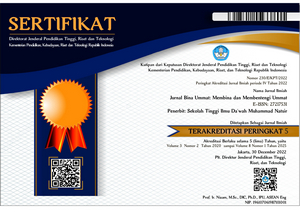CONCEPT AND DEVELOPMENT OF DA'WAH METHODS IN THE ERA OF GLOBALIZATION
KONSEP DAN PENGEMBANGAN METODE DAKWAH DI ERA GLOBALISASI
DOI:
https://doi.org/10.38214/jurnaldawahstidnatsir.v4i2.119Keywords:
Da'wah Method, Concept, Globalization.Abstract
The da'wah method is a form of discourse and wasilah as symbols and visions and missions of da'wah or a form of amar ma'ruf nahi munkar, which must be distributed to the scope of Muslims and various homogeneous people who are basic and have different knowledge backgrounds and different methods of analyzing material and the messages conveyed by the da'i, both those aimed at the minority community still absorbing the minimal knowledge of various dimensions or vice versa. Da'wah methods and strategies in Islam must be more effective in conveying and transferring various materials or messages of da'wah through various concepts, systems. The method of delivery is done well so that people easily accept it. Islam is the last religion revealed by Allah through Prophet Muhammad SAW. As a da'wah religion, Islam always calls on its people to convey its teachings to others, so that every mature and reasonable Muslim is obliged to carry out this Islamic mission. Da'wah is all activities and activities that invite people to change from a situation that contains non-Islamic values of life to Islamic values of life. These activities and activities are carried out by inviting, encouraging, calling, without pressure, coercion and provocation, and not by persuading and seducing the provision of basic necessities and so on. As exemplified by the Prophet, he always conveyed the revelations he received to be conveyed to his people, in order to perfect human morals. So that the concept and development of da'wah methods in the current era of globalization is very necessary to achieve good and maximum da'wah in society.
Published
Versions
- 2022-06-06 (3)
- 2022-06-06 (2)
- 2021-12-31 (1)
How to Cite
Issue
Section
This work is licensed under a Lisensi Creative Commons Atribusi 4.0 Internasional.
Authors who publish with this journal agree to the following terms:
- Authors retain copyright and grant the journal right of first publication with the work simultaneously licensed under a Creative Commons Attribution License that allows others to share the work with an acknowledgment of the work's authorship and initial publication in this journal.
- Authors are able to enter into separate, additional contractual arrangements for the non-exclusive distribution of the journal's published version of the work (e.g., post it to an institutional repository or publish it in a book), with an acknowledgment of its initial publication in this journal.
- Authors are permitted and encouraged to post their work online (e.g., in institutional repositories or on their website) prior to and during the submission process, as it can lead to productive exchanges, as well as earlier and greater citation of published work (See The Effect of Open Access).




